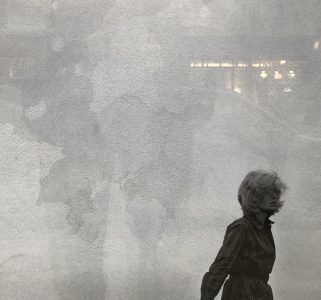
I live right next door to an art college. Art colleges used to be a law unto themselves and the students would explore and express lots of radical ideas and forms of subversion. Now they are more like factories that turn out graduates to serve the creative industries – and hence to make the world seem like a happy glossy place – or, to turn it into a spectacle. (Meanwhile the wars drag on.)
The college next door (which now calls itself a ‘university’ and which looks ‘corporate’ and alienated) runs all sorts of degree courses ranging from Fine Art to the new forms of Digital and Media Art. They also have a degree programme on photography. One of its modules is (or was) called the ‘stranger’ project. I don’t know all the details of the brief but, on two occasions, a different student has knocked on my door and asked if I would be the ‘stranger’ that would be the subject of their project and the focus of their photographs.
On both occasions I said ‘yes’. In fact, I was pleased to participate. For one reason or another I have rarely been photographed and I hoped that the ‘stranger’ project would remedy this. (I looked forward, as Roland Barthes has suggested, to ‘loaning’ my presence as it would come to be manifested in a photograph.) However, on both occasions something very odd happened: After a preliminary meeting the first student, a young woman, then declared that she did not want to do the project and, when it came to photographing me, she said that her camera now ‘felt like a gun.’ I knew that it was common practice in photography to use metaphors drawn from hunting but I suggested that there were other forms of speech that could describe what was going on: and so I asked: “Why not think of the camera as a means of inquiry?” But she resisted this idea and sat disconsolately on a chair as she looked out of the window. For quite some time she carried on looking out of the window. I said nothing. I waited. Then she told me that she would ‘go away’ and ‘think about’ what to do.
In the next meeting, she arrived and announced that I would not actually appear in her photographs. She would photograph some parts of the house in which I lived – and my only involvement (as a presence) would be to sit at a typewriter typing out some notes on white paper. So that was it: I think the only parts of me that may have been included in one of her photographs were the tips of my fingers. But what was even more unexpected was the fact that she never showed me any of the photographs that she submitted to her tutors at the culmination of her project.
On the second occasion, a year later, a young man appeared at the front door hoping to find someone to be the ‘stranger’. It turned out that his first choice of ‘stranger’ had fallen through and he was, it seemed, a little behind schedule. So I volunteered willingly and made an effort to help him by outlining the life I had lived, some of the things I had done, and some of the things I was still doing. I even drove him around to visit the places I liked – such as a blacksmith’s forge in a nearby city. However, he was one of the most introverted characters that I have ever met. What was particularly surprising was that he hardly ever asked me anything. As his taciturn visits unfolded I thought I would get out some of my treasured possessions: I reckoned that he’d be able to do a good project if he focused his camera on the objects and get me to say something about them.
So, on his fourth visit I was ready to show him those prized possessions. But he wasn’t interested. In fact, he didn’t even see any of them. Instead he suggested we play chess – which we did. (Perhaps he was a partial re-incarnation of Marcel Duchamp. Who knows …) And then, just as with the first photographer, I never got to see any of the photographs that he had taken – either of the inside of my house or the ones he had taken from my car window as we drove around or of the places we had visited. I think I may have featured in some of them but I will never know if those were the ones he chose for inclusion in his final work. So for the second year in a row I was left baffled about my failure to appear in a photograph. Maybe I was supposed to remain a ‘stranger’.
But, the ‘stranger’ project did have one good outcome. It served as a catalyst for me to identify some of the really precious objects that I possess. And so the process made me less of a stranger to myself. Still, underneath it all, I had really hoped that somehow, a photographer would actually make something of my presence instead of leaving a kind of nothingness.

